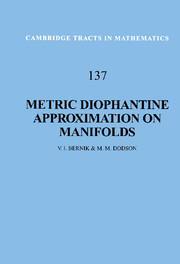Book contents
- Frontmatter
- Contents
- Preface
- Notation
- Chapter 1 Diophantine approximation and manifolds
- Chapter 2 Khintchine's and Groshev's theorems for manifolds
- Chapter 3 Hausdorff measure and dimension
- Chapter 4 Upper bounds for Hausdorff dimension
- Chapter 5 Lower bounds for Hausdorff dimension
- Chapter 6 Diophantine approximation over the p-adic field
- Chapter 7 Applications
- References
- Index
Chapter 7 - Applications
Published online by Cambridge University Press: 04 August 2010
- Frontmatter
- Contents
- Preface
- Notation
- Chapter 1 Diophantine approximation and manifolds
- Chapter 2 Khintchine's and Groshev's theorems for manifolds
- Chapter 3 Hausdorff measure and dimension
- Chapter 4 Upper bounds for Hausdorff dimension
- Chapter 5 Lower bounds for Hausdorff dimension
- Chapter 6 Diophantine approximation over the p-adic field
- Chapter 7 Applications
- References
- Index
Summary
Introduction
Constructing rational approximants of numbers, such as π and the Metonic ratio, which occur in geometry and in the physical world, relies on Diophantine approximation of some sort. It is likely that Diophantine approximation was used to design sophisticated gearing 2500 years ago. Other applications arise from the natural link between rational dependence (corresponding to a Diophantine equation) and the physical phenomenon of resonance and so between Diophantine approximation and proximity to resonance. This can give rise to the ‘notorious problem of small denominators’1 in which solutions contain denominators that can become arbitrarily small, thus making convergence problematic. Small denominators occur in the study of the stability of the solar system (the N-body problem) and in dynamical systems; the fundamental character of these problems has inspired much new mathematics (fuller accounts are in). They also occur in related questions, such as averaging, and linearisation and normal forms.
The basic idea is to exclude sets of denominators which prevent convergence without significantly affecting the validity of the solution. Small denominators are related to very well approximable points, which lie in the complements of sets of points of certain Diophantine type; these complements include badly approximable numbers and their higher dimensional counterparts. The techniques developed in the metric theory of Diophantine approximation lend themselves to the study of the distribution of small denominators and in particular to the analysis of the Hausdorff dimension of the associated exceptional sets.
- Type
- Chapter
- Information
- Metric Diophantine Approximation on Manifolds , pp. 137 - 160Publisher: Cambridge University PressPrint publication year: 1999

